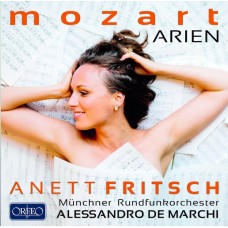您的購物車沒有添加專輯!
搜尋
莫札特:歌劇選曲 (安妮特.芙莉琦, 女高音) / Anett Fritsch - Mozart-Arias
|
It is not often that a young vocal artist releases a debut CD that is so "complete" or so convincingly conceived and finished to such a high polish as is the case with Anett Fritsch. What makes it all the more astounding is that she achieves this by singing arias from the Mozart/Da Ponte trilogy of Figaro / Don Giovanni / Così, masterworks by a composer regarded and feared in equal measure for the complexity of his writing. Yet the repertoire focus she has chosen is entirely in keeping with the soprano's career to date: she began in her teens to appear on the stage in her home town of Plauen in Saxony and from 2009 to 2015 was an ensemble member of the Deutsche Oper am Rhein (Düsseldorf), progressing in recent years through a series of acclaimed performances on international opera stages portraying Mozart's principal female characters, astounding audiences with her versatility by playing several different roles from the same opera. This remarkable success can already be witnessed in permanent visual form on DVD – in Sven Erik Bechtolf's productions of Figaro and Don Giovanni in Salzburg and Michael Haneke's version of Così which caused such a stir in Madrid. What is more, in 2016 she played all of the important female roles in Le nozze diFigaro in the course of just five months: Susanna in Toulouse in April, Cherubino in Munich in June, and La Contessa in Salzburg in August. On this Mozart recording she demonstrates the great diversity of roles within those three works, starting with the Contessa's complex first aria "Porgi amor" alongside Cherubino's ecstatic "Non so più cosa son" and his heartfelt canzona, followed by Susanna's "rose aria" from The Marriage of Figaro. Then from Don Giovanni we hear Donna Elvira's passionate "Ah fuggi il traditor" together with "In quali eccesi" that was added later for the Vienna production. Anett Fritsch considers Donna Elvira to be the most emotionally "all-encompassing" character in the opera, and contrasts her portrayal with the emotionally (and musically) quite different, indeed lightweight approach taken by Zerlina in her efforts to win back Masetto. Fiordiligi's first two great arias are next, from the apparently comic, yet in truth highly cryptic Così fan tutte; they are separated by the frivolous and unintentionally comic erotic advice given by Despina (the first Mozart role that Anett Fritsch ever performed, in 2006) in "Una donna a quindici anni". It is certainly remarkable how flexibly she does vocal justice to the diverse roles, starting from her lyrical base and then adjusting her voice to the challenges of each character, using a higher level of coloratura or adding her own embellishments, placing emotional emphasis where it is needed. Perhaps every era needs to have its own version of Mozart; a sort of composite, truly realistic embodiment of the great composer, and Anett Fritsch seems to have achieved this in a particularly appealing way by giving us a new image of woman through her portrayals. Anett Frisch is accompanied in all this by the Munich Radio Orchestra, arguably the Bavarian city's most flexible ensemble led by the knowledgeable Alessandro De Marchi, who brings a wealth of performance practice to the task. Her recording programme draws to a close with examples from a meaningful, less well known field of Mozart's vocal oeuvre – two expansive concert arias. The two-part, richly modulating aria with the recitative "Bella mia fiamma – Resta, oh cara" was written in Prague for Niccolò Jommelli's Festa teatrale Cerere placata in 1787, at the same time that Don Giovanni was premiered. On this recording, Anett Fritsch takes on a breeches role as Titano as he takes leave of his lover, culminating in him taking his own life. The lyrics "Misera! Dove son! – Ah! Non son io che parlo" were written just a few years before, though worlds apart from Mozart's mature operas, by one of the leading librettists of the early 18th century, Pietro Metastasio. The opera Ezio of 1728, from which the aria is taken, was set more than 50 times, by composers such as Handel in 1732, Gluck in 1750/1763 and as late as 1777 for Munich by Mysliveček. It is no coincidence that the musical style of the aria, yet another in several parts with recitativo accompagnato and arioso, has strong echoes of Mozart's contemporary work Idomeneo, written in and for Munich in 1781 and so highly esteemed by the composer himself. |
編號 |
曲目 |
長度 |
作詞 |
作曲 |
演奏 |
樂團 |
演唱 |
指揮 |
試聽 |
|---|


